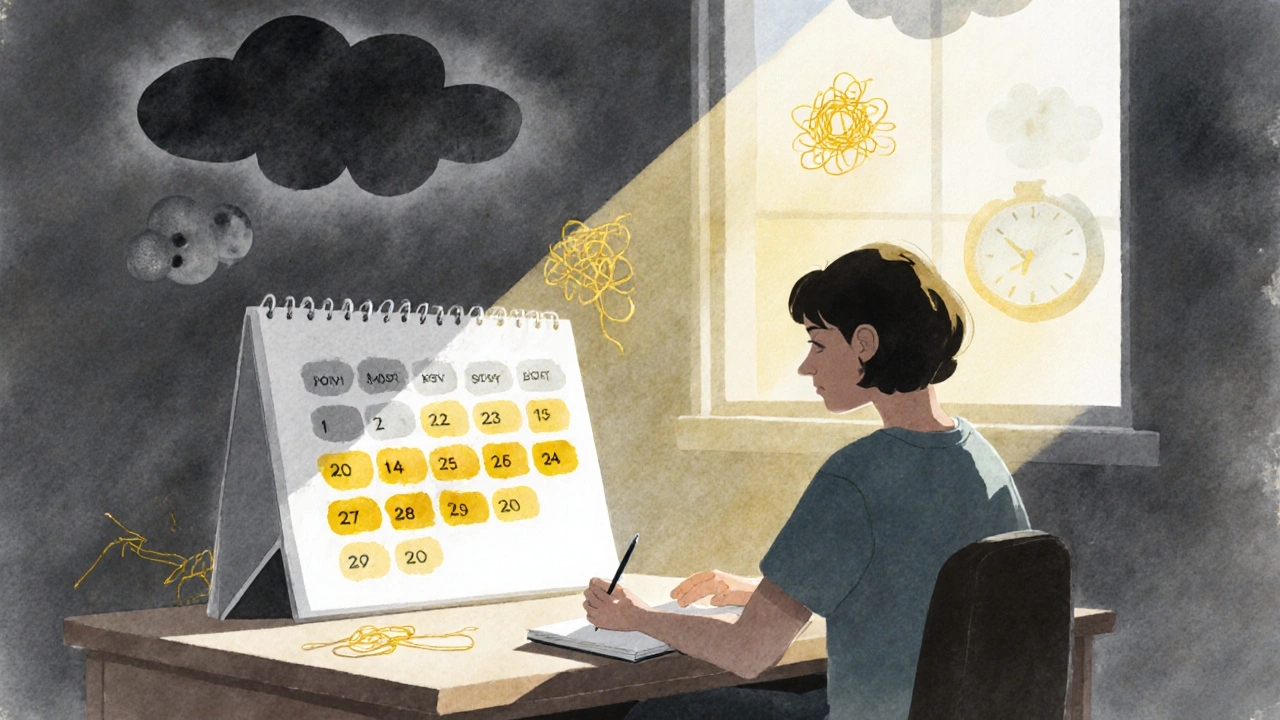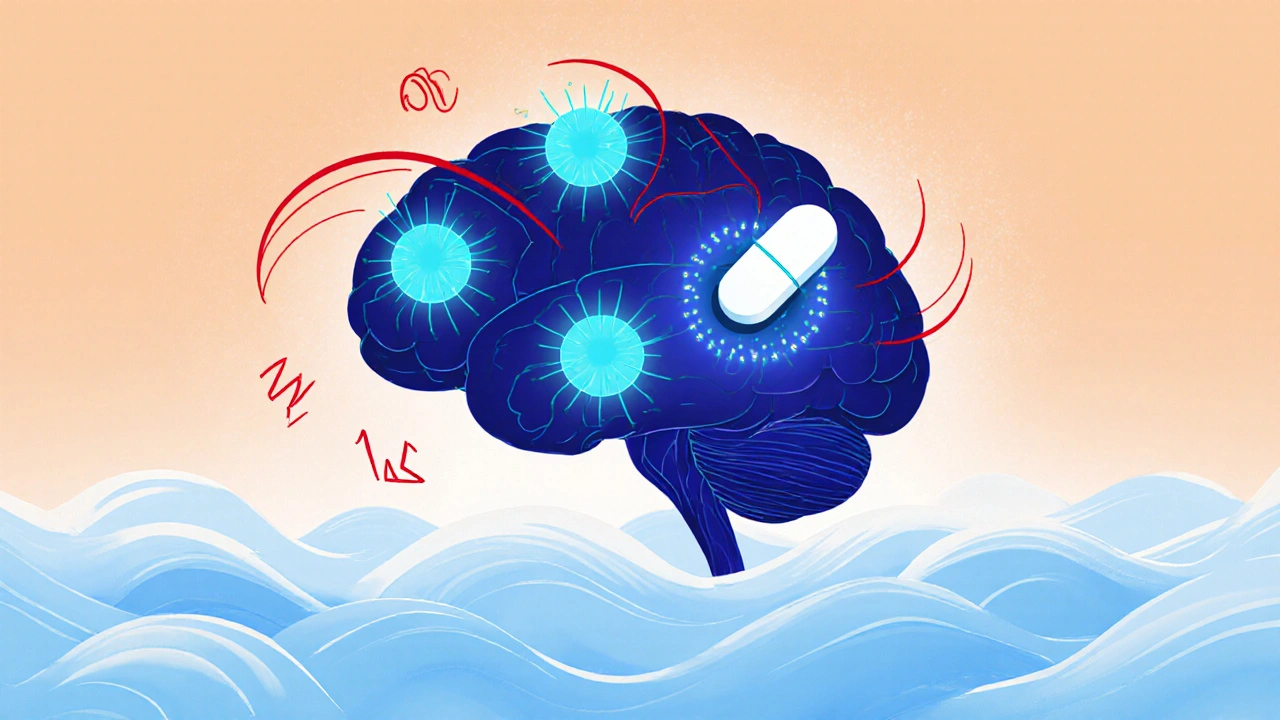If you’ve been prescribed buspirone for anxiety, you’re not alone. Unlike benzodiazepines like Xanax or Valium, buspirone doesn’t make you drowsy, doesn’t cause dependence, and isn’t a controlled substance. But that doesn’t mean it’s simple to understand. Many people start taking it expecting quick relief-only to feel frustrated when it takes weeks to work. This guide cuts through the noise. You’ll learn exactly how buspirone works, who it helps most, what side effects to watch for, and how to know if it’s the right choice for you.
What is buspirone, really?
Buspirone is an anti-anxiety medication approved by the FDA in 1986. It’s sold under the brand name Buspar, but most people now take the generic version. It’s not a benzodiazepine. It’s not an SSRI. It’s not a beta-blocker. It’s its own thing. Buspirone works by affecting serotonin and dopamine receptors in the brain, especially the 5-HT1A receptor. This is different from SSRIs, which increase serotonin levels overall. Buspirone fine-tunes how your brain responds to serotonin, helping reduce anxiety without sedation.
It’s used almost exclusively for generalized anxiety disorder (GAD). That’s the kind where you’re constantly worried-about work, health, money, even small things like being late. People with panic disorder or social anxiety might try it, but it’s not the first-line choice. For those, SSRIs like sertraline or escitalopram are more proven.
What makes buspirone stand out? It doesn’t cause physical dependence. You won’t have withdrawal symptoms if you stop it. You won’t need to keep increasing the dose to get the same effect. And it doesn’t impair your coordination or memory like some other anxiety meds do. That’s why doctors often prescribe it for people who drive, work with machinery, or have a history of substance use.
How long does it take to work?
This is the biggest surprise for most people. Buspirone doesn’t work like a pill you take before a big presentation and feel calm 30 minutes later. It takes time. Most people start noticing changes after 1 to 2 weeks, but full effects usually take 4 to 6 weeks. Some take up to 8 weeks. If you stop after a week because you feel nothing, you’re not failing-you’re just being impatient.
There’s no magic trick to speed it up. Don’t double your dose. Don’t mix it with alcohol or other sedatives. Stick with it. Keep a simple journal: note your anxiety levels each day on a scale of 1 to 10. You’ll likely see a slow, steady drop. That’s normal. That’s how it works.
Compare that to Xanax, which works in 20 minutes but wears off in 4 hours. Buspirone doesn’t give you a quick fix-it gives you a steady foundation. If you need immediate relief during a panic attack, your doctor might suggest a short-term benzodiazepine alongside buspirone. But for long-term management, buspirone’s slow build is actually a benefit.
Who benefits most from buspirone?
Buspirone works best for people with mild to moderate generalized anxiety disorder who:
- Want to avoid sedation or cognitive fog
- Have a history of alcohol or drug use
- Are already on an SSRI and still have residual anxiety
- Need to stay alert at work or while driving
- Prefer non-addictive options
It’s not ideal if you’re in crisis. If you’re having daily panic attacks, severe insomnia, or suicidal thoughts, buspirone isn’t the first tool to reach for. SSRIs, SNRIs, or therapy like CBT are more effective for acute cases.
It’s also not a good fit for people with severe depression. While it can help with anxiety that comes with depression, it doesn’t treat low mood on its own. If you’re feeling hopeless, numb, or unable to get out of bed, buspirone won’t fix that. You’ll need something that targets serotonin more directly, like an SSRI.
Older adults often do well on buspirone. It doesn’t increase fall risk like benzodiazepines do. And because it’s metabolized by the liver-not the kidneys-it’s safer for people with kidney issues. That’s why it’s a common choice for seniors with anxiety.
Common side effects and what to do about them
Side effects are usually mild and fade after the first few weeks. The most common ones include:
- Dizziness (especially when standing up quickly)
- Nausea
- Headache
- Nervousness or restlessness
- Lightheadedness
- Insomnia or drowsiness
Dizziness is the most frequent complaint. It happens because buspirone can slightly lower blood pressure. The fix? Stand up slowly. Wait a few seconds after sitting or lying down. Drink plenty of water. Most people adapt within 10 to 14 days.
Nausea? Take it with food. Not on an empty stomach. That alone cuts nausea in half for most people.
Some feel more anxious at first. That’s rare, but it happens. If your anxiety spikes in the first week, don’t panic. It’s not the medication failing-it’s your nervous system adjusting. Talk to your doctor before stopping. They might suggest lowering the dose temporarily.
Less common but serious side effects include:
- Severe dizziness or fainting
- Uncontrollable shaking (tremors)
- Fast or irregular heartbeat
- Signs of serotonin syndrome: high fever, confusion, rapid heart rate, muscle stiffness
If you’re taking other serotonin-boosting drugs-like SSRIs, SNRIs, or even St. John’s Wort-you’re at higher risk for serotonin syndrome. Tell your doctor everything you’re taking. Don’t assume it’s safe just because it’s “natural.”

Dosage: How much should you take?
Buspirone comes in 5 mg, 10 mg, and 15 mg tablets. The starting dose is usually 5 mg two or three times a day. That’s 15 mg total per day. Your doctor will increase it slowly-usually by 5 mg every 2 to 3 days-until you find the lowest dose that helps. Most people end up between 15 mg and 30 mg daily. Some need up to 60 mg, but that’s rare.
Take it consistently. At the same times each day. Don’t skip doses because you feel fine. The effect builds over time. Missing doses can reset the progress.
It’s not a once-a-day pill. You’ll likely take it two or three times a day. That’s because its half-life is short-about 2 to 3 hours. That’s why you need multiple doses. If you forget one, take it as soon as you remember. If it’s close to your next dose, skip it. Don’t double up.
Food doesn’t block absorption, but high-fat meals can delay how fast it enters your system. That’s not dangerous, but it might make the onset slower. Stick to normal meals. No need to change your diet.
What not to mix with buspirone
Some combinations can be risky. Avoid:
- Alcohol: Increases dizziness and drowsiness. Can make anxiety worse long-term.
- MAO inhibitors: Like phenelzine or tranylcypromine. Can cause dangerous spikes in blood pressure. Wait at least 14 days after stopping an MAOI before starting buspirone.
- Other serotonin drugs: SSRIs, SNRIs, triptans, tramadol, and even some herbal supplements like 5-HTP or St. John’s Wort.
- Strong CYP3A4 inhibitors: Like ketoconazole, itraconazole, clarithromycin. These can raise buspirone levels too high, increasing side effects.
Always check with your pharmacist before starting any new medication-even over-the-counter ones. Cold medicines, sleep aids, and even some antacids can interact.
How do you know if it’s working?
You won’t feel “happy.” You won’t feel “calm” all the time. But you’ll notice differences:
- You worry less about things you used to obsess over
- Your heart doesn’t race as often in crowds
- You sleep better, even if you’re still stressed
- You can focus at work without being distracted by “what ifs”
- You feel less tense in your shoulders, jaw, or stomach
These changes are subtle. That’s why tracking helps. Use a free app like Daylio or just write 3 bullet points in your phone every night. After 4 weeks, look back. You’ll see patterns.
Some people stop because they don’t feel “better.” But “better” isn’t the goal. The goal is to reduce anxiety enough that your life isn’t ruled by it. You might still feel nervous before a presentation. That’s normal. But now you can do it anyway.

Can you stop buspirone cold turkey?
Yes. Unlike benzodiazepines, you don’t need to taper. There’s no rebound anxiety or physical withdrawal. But that doesn’t mean you should quit without talking to your doctor.
If you’re feeling better, your doctor might suggest staying on it for 6 to 12 months to prevent relapse. Anxiety disorders often come back if you stop too soon. If you want to stop, work with your doctor to plan it. Maybe reduce the dose slowly over a few weeks-not because you have to, but because it gives your brain time to adjust.
And if you’re thinking of switching to something else-like an SSRI-don’t stop buspirone until you’ve started the new med. Overlap them for a week or two under your doctor’s guidance. Stopping one and waiting to start another can cause a spike in anxiety.
What are the alternatives?
If buspirone doesn’t work-or you can’t tolerate the side effects-here are other options:
| Treatment | Onset of Action | Addiction Risk | Best For |
|---|---|---|---|
| Buspirone | 4-8 weeks | None | Long-term GAD, non-sedating option |
| SSRIs (e.g., sertraline, escitalopram) | 4-6 weeks | None | GAD, depression, panic disorder |
| Benzodiazepines (e.g., alprazolam) | 20-60 minutes | High | Short-term crisis relief |
| SNRIs (e.g., venlafaxine) | 4-6 weeks | None | Anxiety with chronic pain or low energy |
| Cognitive Behavioral Therapy (CBT) | 8-12 weeks | None | Long-term skill-building |
CBT is just as effective as medication for anxiety-and its effects last longer after treatment ends. Many people combine buspirone with weekly therapy. The medication helps lower the baseline anxiety so therapy works better.
When to call your doctor
Call right away if you experience:
- Thoughts of self-harm or suicide
- Severe dizziness or fainting
- Fast heartbeat, chest pain, or trouble breathing
- Signs of serotonin syndrome (fever, confusion, stiff muscles)
- Unusual mood changes, aggression, or hallucinations
These are rare, but they need immediate attention. Don’t wait. Don’t assume it’s “just a side effect.”
If side effects are mild but annoying-like persistent nausea or dizziness-call your doctor after 2 weeks. They might adjust your dose or timing. Don’t suffer in silence. There are usually fixes.
Final thoughts
Buspirone isn’t a miracle drug. It’s not the fastest. It’s not the most popular. But for the right person, it’s one of the safest, most sustainable tools for managing anxiety. It doesn’t numb you. It doesn’t trap you. It helps you live with less fear-not without fear, but with more control.
If you’ve been told you’re “too anxious” or “overreacting,” buspirone isn’t about fixing you. It’s about giving your brain the support it needs to stop screaming. You’re not broken. You just need the right tool. And for millions of people, that tool is buspirone.
Does buspirone cause weight gain?
Weight gain isn’t common with buspirone. Unlike some antidepressants, it doesn’t significantly affect appetite or metabolism. In clinical studies, less than 2% of users reported weight changes. If you notice unexplained weight gain, check for other causes-like stress eating, reduced activity, or another medication.
Can buspirone be taken with antidepressants?
Yes, but only under a doctor’s supervision. Buspirone is often added to SSRIs or SNRIs when anxiety symptoms persist despite treatment. This is called augmentation. The risk of serotonin syndrome exists, so your doctor will start low and go slow. Never combine them without medical guidance.
Is buspirone better than Xanax for anxiety?
It depends on your goals. Xanax works fast but carries high risk of dependence and withdrawal. Buspirone takes weeks to work but has no addiction potential. For short-term panic attacks, Xanax wins. For daily anxiety you want to manage long-term, buspirone is safer and more sustainable.
Can I drink coffee while taking buspirone?
Yes, but be careful. Caffeine can increase nervousness and jitteriness, which might worsen anxiety symptoms. If you notice your heart races or you feel more on edge after coffee, cut back. Most people can have 1 cup a day without issues, but sensitivity varies.
How long should I stay on buspirone?
Most doctors recommend staying on it for at least 6 to 12 months after symptoms improve. Anxiety often returns if you stop too soon. After that, you and your doctor can decide whether to taper off or continue. Some people stay on it for years with no problems.


Lori Johnson
November 4, 2025 AT 16:59Okay but have you ever noticed how every single pharmaceutical ad says 'no dependence' like it's some kind of miracle? Meanwhile, your doctor's office is full of people on 10 different meds that all interact with each other in ways the FDA hasn't even mapped yet. Buspirone's fine, sure, but it's just the latest flavor of the month. They're all just profit engines with slightly different side effect brochures.
Tatiana Mathis
November 6, 2025 AT 00:31I appreciate how thorough this guide is - especially the part about not expecting immediate results. So many people quit after a week because they think it’s broken, when really, the brain needs time to recalibrate. I’ve seen patients on buspirone for over a year with zero side effects and real, sustainable improvement in their daily functioning. It’s not glamorous, but it’s one of the few anxiety meds that doesn’t leave you feeling like a zombie or a liability at work. Consistency is everything.
Nishigandha Kanurkar
November 6, 2025 AT 22:59Michelle Lyons
November 8, 2025 AT 21:21Cornelle Camberos
November 10, 2025 AT 14:48It is my solemn duty to inform you that the efficacy of buspirone has been grossly overstated by corporate-funded clinical trials. The 5-HT1A receptor hypothesis is a theoretical construct with negligible empirical validation. Furthermore, the FDA's approval in 1986 occurred during a period of regulatory capture, wherein pharmaceutical lobbying exerted undue influence. I recommend cognitive behavioral therapy, which, unlike pharmacological interventions, does not involve the ingestion of chemically synthesized compounds that may be linked to systemic inflammation.
joe balak
November 11, 2025 AT 09:35Iván Maceda
November 11, 2025 AT 17:17Vrinda Bali
November 12, 2025 AT 08:47John Rendek
November 13, 2025 AT 11:24Sonia Festa
November 14, 2025 AT 03:00Sara Allen
November 15, 2025 AT 08:53Amina Kmiha
November 16, 2025 AT 10:47Ryan Tanner
November 18, 2025 AT 04:03